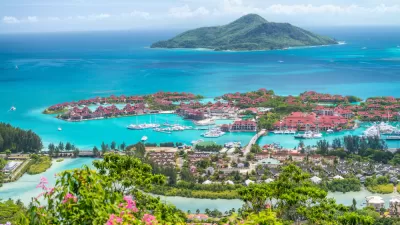The Maldives has pledged to be entirely carbon-neutral by 2020. The president has hired a team of environmentalists to put the pledge into action.
"The Maldives, a collection of atolls in the middle of the Indian Ocean, stands less than two metres above sea level. That means it will probably be the first country to disappear as sea levels continue to rise-and, in the meantime, growing storm surges will make life there parlous.
Yet the Maldives' contribution to climate change is minimal. Fewer than 400,000 people live there and most of those own neither a car nor many electrical appliances. Even the carbon emissions generated by newlyweds flying in for their honeymoons-the mainstay of the economy-are negligible compared with what those holiday-makers generate at home.
Mr Nasheed [the President of the Maldives] has recruited two British environmentalists, Mark Lynas and Chris Goodall, to draft a plan for the Maldives to replace the oil that fuels the country's generators, cars and boats with power from solar panels, wind turbines and biofuels. This, they reckon, will cost $1.1 billion. It will, however, spare the place the expense of importing petrol, diesel and kerosene, and so pay for itself in 10 to 20 years, depending on the price of oil."
FULL STORY: A tiny country is planning to go carbon-neutral

Planetizen Federal Action Tracker
A weekly monitor of how Trump’s orders and actions are impacting planners and planning in America.

Map: Where Senate Republicans Want to Sell Your Public Lands
For public land advocates, the Senate Republicans’ proposal to sell millions of acres of public land in the West is “the biggest fight of their careers.”

Restaurant Patios Were a Pandemic Win — Why Were They so Hard to Keep?
Social distancing requirements and changes in travel patterns prompted cities to pilot new uses for street and sidewalk space. Then it got complicated.

Platform Pilsner: Vancouver Transit Agency Releases... a Beer?
TransLink will receive a portion of every sale of the four-pack.

Toronto Weighs Cheaper Transit, Parking Hikes for Major Events
Special event rates would take effect during large festivals, sports games and concerts to ‘discourage driving, manage congestion and free up space for transit.”

Berlin to Consider Car-Free Zone Larger Than Manhattan
The area bound by the 22-mile Ringbahn would still allow 12 uses of a private automobile per year per person, and several other exemptions.
Urban Design for Planners 1: Software Tools
This six-course series explores essential urban design concepts using open source software and equips planners with the tools they need to participate fully in the urban design process.
Planning for Universal Design
Learn the tools for implementing Universal Design in planning regulations.
Heyer Gruel & Associates PA
JM Goldson LLC
Custer County Colorado
City of Camden Redevelopment Agency
City of Astoria
Transportation Research & Education Center (TREC) at Portland State University
Camden Redevelopment Agency
City of Claremont
Municipality of Princeton (NJ)



























